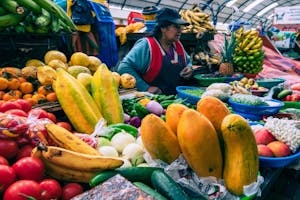- 6 minute read
- Industry Insights
- Local Strategies
All Skill Levels
Get a behind-the-scenes-look into FareHarbor's 2024 season

Veganism has far surpassed being a new diet trend. In fact, WTVOX estimates there are 79 million vegans worldwide. With veganism and vegetarianism entering the mainstream, it’s time for tour operators to revisit the way we look at food tours and culinary experiences. As bookings for vegan and vegetarian holidays continue to increase and the public places greater emphasis on personal health, vegan tourism will see another growth spurt.
If you’re not used to catering to vegans and vegetarians, the concept might seem foreign to you. The good news is that, especially for food tour operators, creating vegan experiences is no different from adding a new tour option to your rotation or providing information about local vegan/vegetarian establishments. Not only will doing so expose your business to new audiences, but it will also help you support other local businesses and worldwide sustainable travel initiatives.
Many people choose veganism or vegetarianism to mitigate the effects of meat and dairy production on the environment and animals. More than a simple diet, veganism is a lifestyle that positively affects the environment. Since animal agriculture is a huge contributor to greenhouse gases, global warming, and climate change, going vegan is a choice that helps preserve the planet for future generations. There’s also the added benefit of eating healthier.
When vegans/vegetarians travel, there’s added pressure to find good food since they can’t prepare their meals at their accommodation. And we all know trying new food is one of the best parts of traveling! But beyond wanting to sample local delicacies, vegan and vegetarian travelers have the same motivations as sustainable travelers: to reduce environmental stress caused by travel, seek off-the-beaten-path destinations, and avoid negatively impacting the destination.
Eating less meat while traveling and opting for locally-sourced produce lowers travelers’ carbon footprint on vacation. Travel and tourism have a big impact on the environment, and eating vegan or vegetarian is just another way to be an eco-conscious traveler.

Are you able to offer vegan or vegetarian food tours in your area? Start doing some research on local restaurants to find those that would be receptive to partnering with your business for a food tour. Even if you’re unable to find restaurants that are fully vegan or vegetarian, you should be able to choose suitable menu items to feature on a food tour.
Think outside of the box! Restaurants don’t have to be the only type of establishment on a veggie/vegan food tour. Visit farmers market stalls, specialized grocery stores or markets, or stores that sell organic/vegan products. This London tour operator takes guests to stores with vegan fashion accessories and chocolate as well as ethical brands and sustainable products.

If you do have a vegan or vegetarian option, or you’re able to accommodate vegans and vegetarians on your regular food tours, make this fact clear in the tour description and FAQs to entice travelers with dietary restrictions to book.
Are you a tour operator whose business has nothing to do with food? Maybe you offer surfing tours and are wondering how you can take advantage of the vegan/vegetarian movement. You don’t have to be a food tour operator to support vegan travelers. No matter what kind of business you operate, you can position yourself as a resource for travelers looking for information about your location.
Consider writing a blog about vegan-friendly restaurants and businesses in your area, or create a page on your website that lists vegan-friendly establishments, like ones that create products from vegan leather or organic materials. There might even be vegan/vegetarian hotels in your area! Shout out local businesses on social media or consider adding a vegetarian/vegan food option if your tours include lunch.
Remember, vegans don’t go on vacation just to eat – they might be looking for tours and activities like yours to keep them entertained, and they’ll be more receptive to your business if you provide excellent travel guides and resources about your destination.
Want to keep up with the latest in travel and tourism? Don’t miss our guides on marketing to millennials and Gen Z and catering to road trippers.